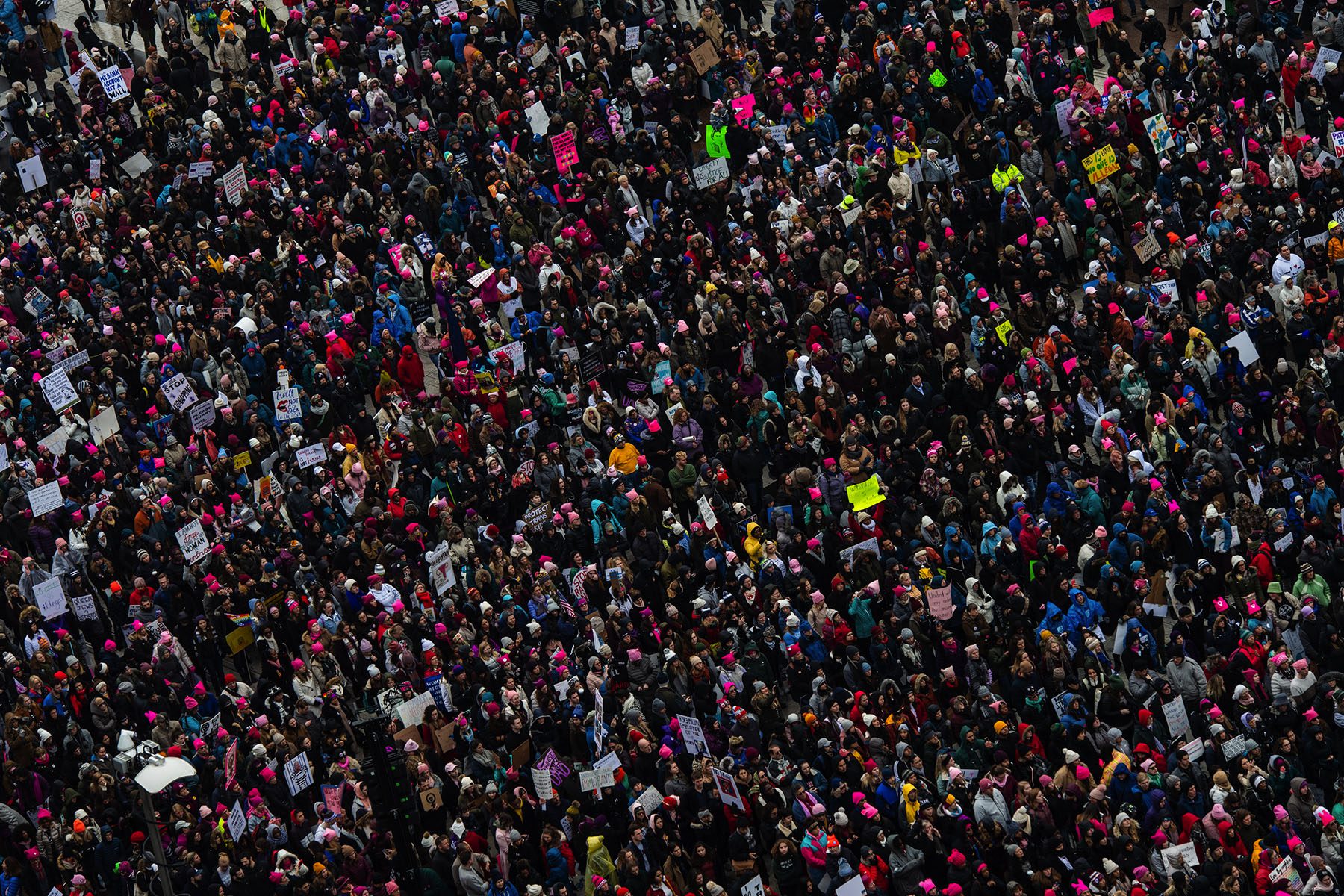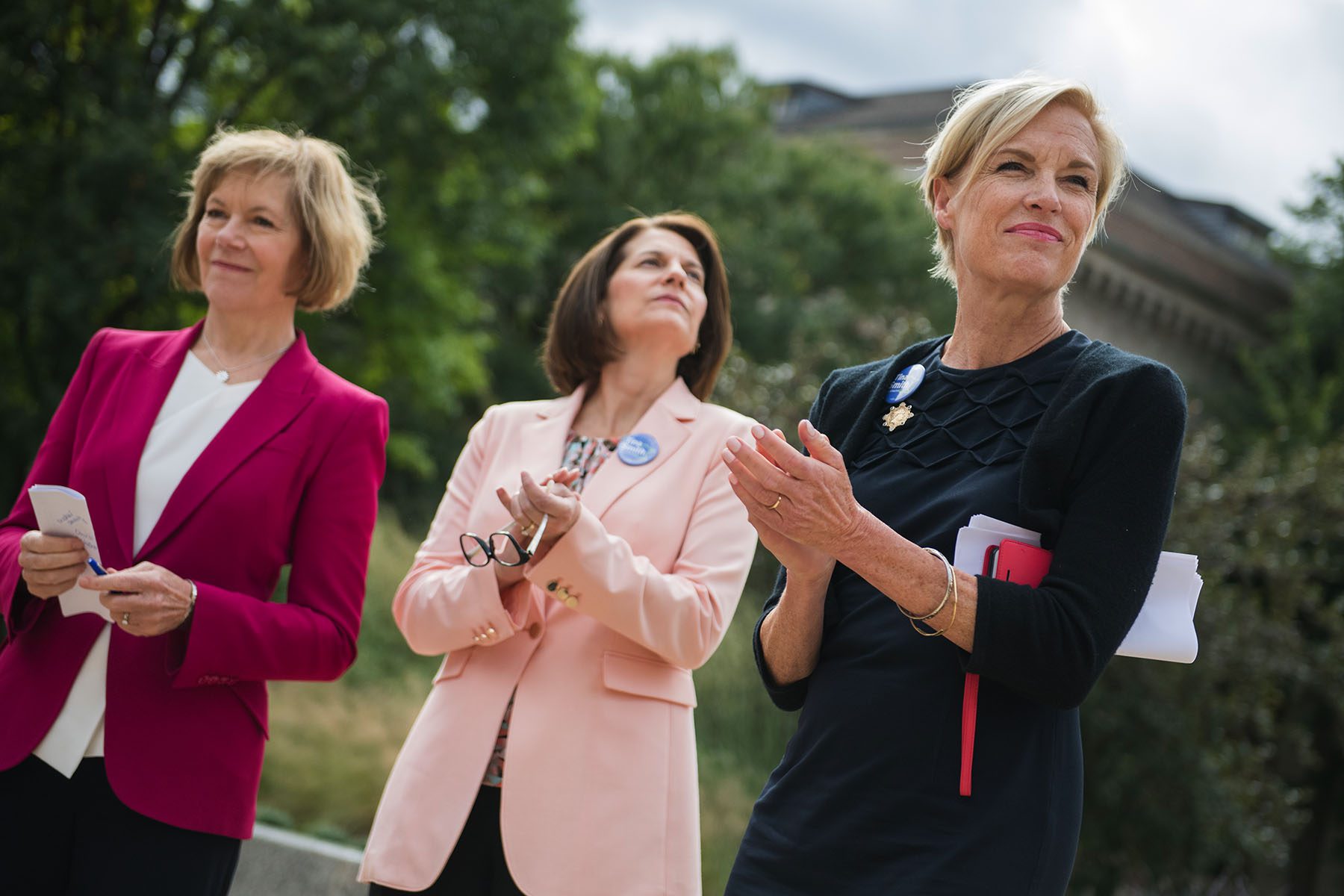The day after the inauguration of former President Donald Trump, hundreds of thousands of people came to Washington, D.C., and cities across the country for the first Women’s March. For so many, it represented visible collective action and condemnation of the way misogyny had played into the new president’s campaign. It was a showing against the way that Trump had characterized women, LGBTQ+ people and many other marginalized groups.
The fifth Women’s March, scheduled for Saturday, occurs against a different backdrop: Texas enacted its most restrictive anti-abortion law a month ago, which will be the rallying focus behind this year’s multi-city demonstration.
In 2017, Cecile Richards, then the president of Planned Parenthood and the Planned Parenthood Action Fund, spoke at the march about the imminent threat to reproductive rights facing Americans. Richards is now the co-chair of American Bridge, a progressive research and rapid response group. She’s once again slated to speak at the Women’s March, where she will focus on the role that private companies have played in funding the anti-abortion lawmakers who not only led the passage of Senate Bill 8 in Texas, but are pushing copycat legislation nationwide. In Texas, AT&T donated $645,383 to the primary sponsors of SB 8; Time Warner Cable/Charter Communications donated $523,661; NBC Universal donated $88,000.
The 19th spoke to Richards about the significance of the fifth march, why she believes corporate accountability needs to be part of the reproductive justice movement, and the role and relevance of this kind of public demonstration at this moment.
This interview has been edited for length and clarity
Jennifer Gerson: What do you see as the role of the Women’s March now? What does it represent today in the context of what it meant five years ago and what do you think it will continue to mean looking ahead in the future?
Cecile Richards: The original march was, of course, a moment we will never forget. In that sense, I feel like it demonstrated the power of really organic organizing and the power of people just going to the streets. I don’t know what to expect this Saturday, but I know I have the same feeling I had after the election of Donald Trump — I gotta be somewhere, and I need to be with other folks as outraged and motivated as I am.
After being online with everyone for two years, I think this is a moment when people feel energized about being together again. I think we’ll never recreate the moment that was the first march, but I think it’s important to build the world we want to see — and that requires a lot of things: Voting, people running for office, people telling their stories. But that also requires marching and taking action. To me, that’s the spirit of the Women’s March.
Like you mentioned, the first Women’s March was such a galvanizing moment for so many people — what sort of action items do you hope people take away with them after Saturday’s events?
I hope they get reenergized. I think there is this exhaustion after four years of Donald Trump and quite understandably so. Women have been marching, going to town hall meetings, voting, raising their voices. The sheer relief of having him out of office has created a place for women to say, “OK, now I want to take care of myself, my family, my community.” And yet this is the time we have to push through.
As important as the Women’s March was the last time around — that day was a springboard for what came later, which was of course women getting engaged in politics, voting, showing up and advocating in record numbers. I hope that Saturday is not an endpoint, but the beginning of this next important phase for women’s political engagement.
Do you think we still need an annual Women’s March and what role do you think something like this can continue to play in advancing change versus other forms of grassroots activism?
One of the most exciting things that happened five years ago out of the Women’s March was that you couldn’t throw a rock without hitting a new women’s organization — there was not a town, suburb or hamlet in this country that didn’t start something. Women came out and said, “We can’t wait for an annual time to get together and march.” That’s why you saw a record number of women — and especially women of color and young people — running for office and getting elected afterwards. And this ended up shaping the 2018 midterm elections.

What do you think should be the first thing that happens on Monday morning in terms of next steps as we look ahead at what’s currently happening in Texas with SB 8?
Texas is the second-largest state in the country. Millions of people are impacted by this policy and the other policies that this legislature and this governor have enacted there. It is critically important that businesses understand that these laws affect their employees, their consumers and the health of the communities in which they do business. It is incumbent on them to speak up and stand in solidarity with the people of Texas. This law was not passed because the people of Texas asked for abortion to be illegal. It passed because of craven, political, partisan reasons that had everything to do with the political aspirations of some Republicans in office and zero to do with the health and wellbeing of the people of Texas.
When something this horrific happens, it’s important that not only people in Texas but all over the country stand up and say, “This is not the kind of country we want to live in. This is not the kind of policy we want and not the kind of situation that is acceptable.” The whole world is watching right now — including our Congress, governors across the country, and the Supreme Court. It is incredibly important that we don’t just march for one day but continue to ring the bell.
What made the corporate responsibility component of reproductive justice feel like an issue that was especially relevant for you to bring to the Women’s March this year?
We’re at this interesting moment where companies all have this external brand language that is all “women’s empowerment” and “women’s equality” and “women’s participation” — and yet they are funding the very politicians who are making it impossible for women to be equal partners in the economy, in our society, in our politics. So I think it is important that if they are going to talk the talk, they need to walk the walk. They make decisions every day about where to put their political dollars and what their statements are, and it’s time to take a stand.
It’s not controversial to be in favor of safe and legal abortion. The Roe decision is overwhelmingly supported in this country. It is incredible to me that we saw the Women’s Health Protection Act pass the House without a single Republican vote. It shows how craven the Republican party has become about what has been a fundamental right for 50 years. It’s important that the business community and employers stand up on behalf of their employees.
Now that we have legislatures and governors in other states [introducing SB 8 copycat bills] it’s a real moment for employers in all of these states to say, “No — not on my watch. This will not be coming to a theatre near us. We cannot operate in a state where our community, our employees and our consumers have lost their rights.”
It’s incumbent on us as a movement and as activists to educate people on which companies are standing with them and which companies are not. It’s not just about penalizing who is doing the wrong thing, but patronizing those standing up for safe and legal abortion and the rights of their employees and consumers.
When you look at what is happening right now in Texas, what do you think is most important for people to understand about this situation and what it means for the future of reproductive rights in the United States?
Well, unfortunately, Texas is going to be our first experiment of having a state where Roe is no longer the law of the land, and where safe and legal abortion is virtually impossible to access. So what’s important to me is that the real, lived experiences of people and families who have lost these rights be told.
I am pretty cynical about these politicians in Texas, in particular, who have passed these outrageous bills. It’s just a political slogan for them, to be pro-life, anti-choice. It’s a free ride — they can take these positions and pass these outrageous bills and never really suffer any consequences. But now the tables have turned.
The Supreme Court was unwilling to declare unconstitutional what is a clearly unconstitutional law, and this has now impacted millions of people in Texas who have lost the right — overnight — to make decisions about their own pregnancies. These stories need to be told about what this situation means for the real day to day lives of people in the state of Texas who literally now have the state and their government determining the most personal and private kinds of decisions people will ever make.
Every single one of the legislators there — Gov. Greg Abbott, Lt. Gov. Dan Patrick — this is all on them now. The pain and suffering and cruelty that has been meted out — they are responsible for that and we have to hold them accountable. Forget the political slogans and policies. Let’s just talk about the real, lived experiences of those who have been impacted by this. And these people everyone’s been covering for? That’s on them now. They have to be held accountable. I hope they all lose their jobs.






